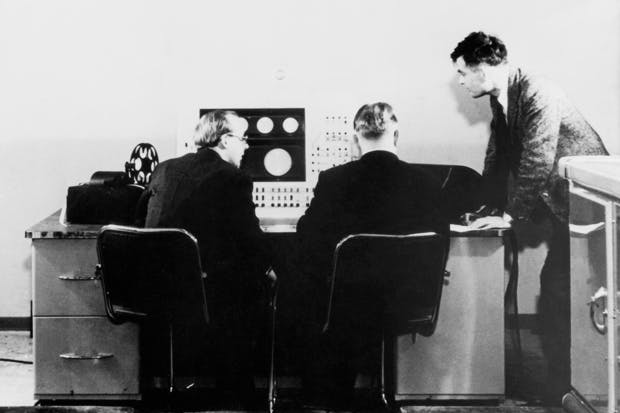Ross Clark is a columnist I try to read because he is never trite. So I was sorry to miss performances of his musical play staged earlier this month. Shot at Dawn is about a sister’s quest for a recognition (after his death) of her brother, Harry Briggs, a soldier in the Great War who was executed for desertion. The play is sympathetic to the idea of posthumous pardon; coupled with this, it’s a lament that society punishes people without trying to understand why they do what they did.
A second theme emerges: homosexuality, and the difficulty (then) of living with this in a world that does not understand. I suppose you could say that Ross’s play is about looking back not in anger but in sympathy.
Here’s a heresy, then. I intend no offence to legions of noble souls for whose posthumous pardons a powerful and moving defence can be made, but there’s an opinion I cannot shake off. I don’t believe in posthumous pardon — no, not even of Alan Turing.
Turing, a mathematician and computing expert, worked during the second world war at Bletchley Park, and his efforts were key to the breaking of the Enigma code, an immense and important achievement. But in 1952 he was convicted of indecency with another man (behaviour which would not be criminal today) and his subsequent history is very sad. To avoid imprisonment he chose chemical castration, and later (according to the accepted account) committed suicide. The affair was a monstrous injustice in everything but the strict legal sense of that word.
But Turing did commit what was, according the law at that time, indecency with another man. His conviction cannot be quashed (as was that of Derek Bentley, hanged for murder a year earlier after being convicted on unsafe evidence), because in Turing’s case due process was followed. This is why, after a huge campaign, the device of a posthumous royal pardon was chosen, and granted in 2013.
Why? And more particularly, why just Turing? Except where key evidence has been discredited, I believe convictions should be left to lie where they fell. Retrospectively fiddling around with long-settled cases just because they’ve become famous is philosophically sloppy: an irrational surrender to the emotional tide. It is also a slippery slope.
The idea of posthumous ‘pardon’ is set in a curious twilight in the English mind. In law it does not overturn or reverse a court’s verdict, but is an act of royal mercy or clemency. In the popular imagination, however, a pardon is somewhat confused with the notion of nullifying or erasing a conviction, but it is really closer to the idea of forgiving than of exculpating. It is not, however, the same as forgiving, for we may forgive the most awful crimes, forgiveness reflecting on the mind and heart of the forgiver rather than the guilt or otherwise of the forgiven. A pardon reflects on (and rehabilitates) the pardoned, connoting some vague sense of recompense because justice was not done. Well, you may say, in that case isn’t a pardon precisely what men like Turing — or indeed Briggs — deserve?
It depends. If you think the main reason to pardon Turing or Briggs is that there was something wonderful about them that so elevates the life in question that other culpabilities are outweighed in the balance — that they have, so to speak, transcended their crime — then you do have a case for a posthumous pardon. But you would also have a case for the posthumous pardon of a convicted paedophile who was (say) awarded the VC for bravery in war; or a notorious fraudster who left billions to the poor.
If, on the other hand, you think the main reason to pardon Briggs or Turing is that there has been a change in public sentiment towards their supposed wrongdoing (in Turing’s case homosexuality, in Briggs’s cowardice) and there should never been a law against what they did in the first place, then be clear about this: behind these two wait millions more, forgotten by our age.
To take, first, the famous: what about Peter Wildeblood, whose 1950s novel Against the Law helped inform the Wolfenden Committee, to whom he gave testimony, and was part of the attitudinal change that allowed the committee to recommend the limited decriminalisation of homosexuality? Previously, Wildeblood had been imprisoned for homosexual offences relating to the incidents that led to the imprisonment of Lord Montagu of Beaulieu. It isn’t long since Wildeblood died. Montagu is still alive. None of the offences of which either was convicted would be offences now.
And after Wildeblood, all through the 1950s, 1960s, 1970s and 1980s, follows a procession of tens of thousands of forgotten men whose lives — those that did not end in suicide — were variously stained or wrecked by convictions under laws that have now been abolished. I recall campaigning as an MP in the 1980s against the Metropolitan Police’s outrageous ‘pretty policemen’ policy of entrapping gay men (‘It was just an effortless way of adding to our conviction rates,’ one told me recently). A pardon for all of these?
I mentioned suicide. In many of our lifetimes, this too was illegal. The law finally fell into disuse, but not before many pathetic individuals were paraded through the courts for the crime of trying to kill themselves. Why not a posthumous pardon for these?
How about the suffragettes, convicted of public order offences? The Quakers imprisoned for refusing to swear the Oath? Poachers who were executed? What if we scrap the anti-hunting laws — should there be pardons for those convicted while they were in force? And why only posthumously; should the living have no redress?
Ah, redress. With redress these days can come money. Should individuals still living, whose lives have been scarred by convictions for behaviour we no longer stigmatise, be entitled to the compensation we offer victims of the behaviour we do?
No. Society changes. Attitudes change. Old sins are abolished and new sins raised up in their place. Let’s rejoice that our generation is not taking the prisoners our forefathers’ generations took, forgive both the once-persecuted and their once-persecutors but — shedding a quiet tear for Harry Briggs and Alan Turing — block our ears to the cry for redress. It’s too late.
Got something to add? Join the discussion and comment below.
Get 10 issues for just $10
Subscribe to The Spectator Australia today for the next 10 magazine issues, plus full online access, for just $10.















Comments
Don't miss out
Join the conversation with other Spectator Australia readers. Subscribe to leave a comment.
SUBSCRIBEAlready a subscriber? Log in